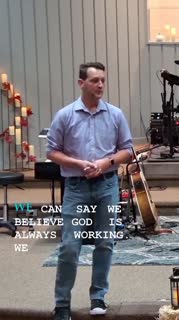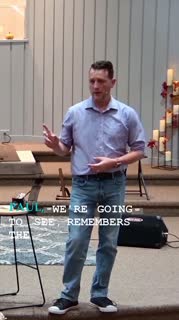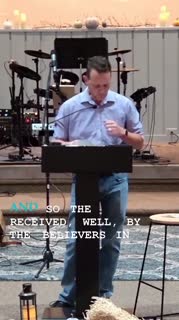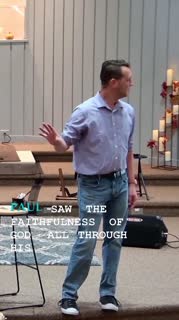Trusting God's Faithfulness Amid Trials and Community
Devotional
Sermon Summary
Bible Study Guide
Sermon Clips
1. "We can say we believe God is always working. We can say God is always working, but do you ever feel like he's not? Anybody? You ever feel like God's not working? Maybe God's forgotten. God doesn't care. Maybe just this isn't high on his radar right now. We can sometimes feel like God's not working. We can encounter situations in our life where we feel like God is not working. God is forgotten. God is not here. God doesn't care. We can feel that way, but the thing we see through the book of Acts, the thing we will see as we continue the book of Acts, and the thing we need to do ourselves is to remember that though I may not see how God is working, though I may not feel like God is working, I can know and I can trust that he is, because he always has." [00:41:07] (56 seconds)
2. "Paul, we're going to see, remembers the faithfulness of God in the past, and we, in the midst of our own trials, in the midst of our own hardships, in the midst of things where we're like, God, what are you doing? Aren't you at work at all? We can remember his faithfulness in the past, and his faithfulness in the past is evidence of his faithfulness now, and his continued faithfulness into the future. Whether I feel like he's being faithful right now or not, doesn't change who he is, and doesn't change what I know he's done in the past." [00:42:24] (38 seconds)
3. "And so the received, well, by the believers in Jerusalem, he meets with them, says that he meets with James and then with all of the other elders. This is James, the half-brother of Jesus, the James who writes the epistle of James. This is not James, the brother of John. James, the brother of John, was the first in Acts. He's the first martyr under the Roman Empire. And so this is James, the half-brother of Jesus, meets with him, meets with the elders, tells them the work that God is doing among the Gentiles, and they praise God because the gospel is being spread. And that should always be the church's response to God's word going out. That should always be the church's response to people being saved. That should always be the church's response to God at work. We should praise him." [00:54:40] (52 seconds)
4. "Paul goes and he does this. He's not doing it to say that he's obedient to the law, that he is bound under the law. He's not showing the validity of the law, but he is following, he's following his culture and he has a desire to help. He has a desire to have his own people come to know Jesus and he's not further barriers in the church. That's where he goes and he does this. And this actually leads us to the next part. Verses 27 to 40, Paul's arrest. Paul is arrested in Jerusalem." [00:59:37] (32 seconds)
5. "Paul's well-educated. Paul is well-educated. He goes into his pedigree. I'm a Jew of Jews. I'm a Pharisee of the Pharisees. I was trained by Gamaliel. Gamaliel was referenced previously in the book of Acts. As the apostles are going out, they're proclaiming the gospel. The church is blowing up. I mean, it's growing like crazy. And the Jews have serious problems with this. The Pharisees, the Sadducees. And so they're talking amongst themselves, what are we going to do about this? And Gamaliel stands up. And Gamaliel says, if this is from man, if this church, if Jesus, if this stuff is from man, it's going to die just like every other one has. And he says, I'm going to die just like every other one has. And he talks about particular instances in Jewish history. He says, but if this is of God, who can stand against him?" [01:08:27] (55 seconds)
7. "Paul saw the faithfulness of God all through his life. And he called on it regularly. When he had opportunity to tell people about what God had done, he would do it. That's what he does to the Jews that just tried to kill him. He tells them about the faithfulness of God. Jesus is the one who saved him. God's the one who sent him out to the Gentiles. God's the one who's been faithful in all of this. He just told the leaders in Jerusalem about the faithfulness of God amongst the Gentiles. In the moment, he may not have recognized God at work right then. He may not have seen how God was working right then." [01:20:02] (56 seconds)
8. "When we feel like God's not listening, when God's not working, when God's not here, when God doesn't care, we can look back at this faithfulness in the past, and we can know even when we don't feel it, we can know that's who he is. And that's what real faith is. Knowing. Knowing. Faith is not some empty hope. Faith is a conviction. It's a convincing that this is true. It is a full persuasion of something. And even when we don't see it, we can still be fully persuaded that God is who he says he is. And God will follow through with what he said he would do." [01:21:19] (47 seconds)
Ask a question about this sermon
2. "Paul, we're going to see, remembers the faithfulness of God in the past, and we, in the midst of our own trials, in the midst of our own hardships, in the midst of things where we're like, God, what are you doing? Aren't you at work at all? We can remember his faithfulness in the past, and his faithfulness in the past is evidence of his faithfulness now, and his continued faithfulness into the future. Whether I feel like he's being faithful right now or not, doesn't change who he is, and doesn't change what I know he's done in the past." [00:42:24] (38 seconds)
3. "And so the received, well, by the believers in Jerusalem, he meets with them, says that he meets with James and then with all of the other elders. This is James, the half-brother of Jesus, the James who writes the epistle of James. This is not James, the brother of John. James, the brother of John, was the first in Acts. He's the first martyr under the Roman Empire. And so this is James, the half-brother of Jesus, meets with him, meets with the elders, tells them the work that God is doing among the Gentiles, and they praise God because the gospel is being spread. And that should always be the church's response to God's word going out. That should always be the church's response to people being saved. That should always be the church's response to God at work. We should praise him." [00:54:40] (52 seconds)
4. "Paul goes and he does this. He's not doing it to say that he's obedient to the law, that he is bound under the law. He's not showing the validity of the law, but he is following, he's following his culture and he has a desire to help. He has a desire to have his own people come to know Jesus and he's not further barriers in the church. That's where he goes and he does this. And this actually leads us to the next part. Verses 27 to 40, Paul's arrest. Paul is arrested in Jerusalem." [00:59:37] (32 seconds)
5. "Paul's well-educated. Paul is well-educated. He goes into his pedigree. I'm a Jew of Jews. I'm a Pharisee of the Pharisees. I was trained by Gamaliel. Gamaliel was referenced previously in the book of Acts. As the apostles are going out, they're proclaiming the gospel. The church is blowing up. I mean, it's growing like crazy. And the Jews have serious problems with this. The Pharisees, the Sadducees. And so they're talking amongst themselves, what are we going to do about this? And Gamaliel stands up. And Gamaliel says, if this is from man, if this church, if Jesus, if this stuff is from man, it's going to die just like every other one has. And he says, I'm going to die just like every other one has. And he talks about particular instances in Jewish history. He says, but if this is of God, who can stand against him?" [01:08:27] (55 seconds)
7. "Paul saw the faithfulness of God all through his life. And he called on it regularly. When he had opportunity to tell people about what God had done, he would do it. That's what he does to the Jews that just tried to kill him. He tells them about the faithfulness of God. Jesus is the one who saved him. God's the one who sent him out to the Gentiles. God's the one who's been faithful in all of this. He just told the leaders in Jerusalem about the faithfulness of God amongst the Gentiles. In the moment, he may not have recognized God at work right then. He may not have seen how God was working right then." [01:20:02] (56 seconds)
8. "When we feel like God's not listening, when God's not working, when God's not here, when God doesn't care, we can look back at this faithfulness in the past, and we can know even when we don't feel it, we can know that's who he is. And that's what real faith is. Knowing. Knowing. Faith is not some empty hope. Faith is a conviction. It's a convincing that this is true. It is a full persuasion of something. And even when we don't see it, we can still be fully persuaded that God is who he says he is. And God will follow through with what he said he would do." [01:21:19] (47 seconds)







